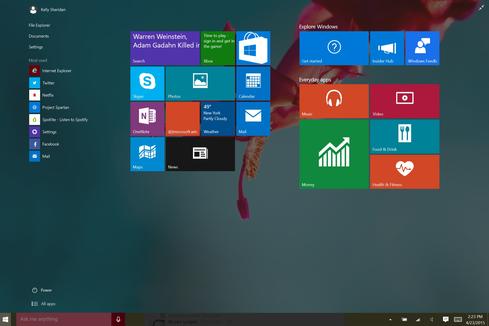Enterprise Mobile Strategy, Meet The Connected Toilet
The way you're thinking about mobile may not be broad enough.

Windows 10 Build 10061: App Revamps Galore
Windows 10 Build 10061: App Revamps Galore (Click image for larger view and slideshow.)
Enterprise mobile strategy today extends beyond smartphones. For one banking group at least, it stretches all the way to toilets.
Speaking as a panelist at Interop in Las Vegas on Wednesday, Dominic Wilde, vice president of product management at HP, said that after client Rabobank in the Netherlands installed a wireless edge network, one of the first requests for connectivity came from the bank's facilities group, which wanted to monitor how often the toilets get flushed. The goal, he said, was to minimize the amount of chemicals used for cleaning.
"The hyperconnected toilet is now a real thing," said Wilde.
Mobile strategies should be shaped by organizational needs, but those addressing the issue, including panelists Vivek Shaiva, CIO at La Quinta Inns and Suites, and Evan Maloney, principal engineer at Gilt Groupe, advised against drawing such strategies too narrowly because the definition of mobile IT keeps evolving.
Moderator Stephanie Stahl, VP of content marketing at UBM Tech, suggested that mobile strategies need to encompass the Internet of Things.
Maloney concurred, noting that the traditional definition of mobility doesn't reflect technological changes like Amazon's Dash button, a physical button available to Amazon customers that can be affixed anywhere and will place an online order for a specific product when pushed.
"The way we think of mobile today doesn't really factor that into account," said Maloney, suggesting that the definition of mobile will become less device-centric and more focused on services.
For Shaiva, who sees the smartphone as a remote control for cloud services, mobile strategy is all about simplicity. "If I were to summarize our mobile strategy, it would be one-thumb bookings," he said. "Our mandate was that our guests should be able to book a room with just one thumb."
But simplicity as a design goal doesn't mean companies will find it easy to implement their mobile initiatives.
To enable mobile projects, Shaiva advises starting with the backend. "Move your systems to the cloud and more importantly service-enable them, which means expose an API," he said. "It frees you up from being tied to legacy systems."
Also, make sure you can get a return on your investment. Shaiva noted that enabling smart door locks in 80,000 rooms is not a trivial expense.
Wilde said the challenge with IoT initiatives is often more political than technological.
"Often with IoT, [for things like sensors,] that's being driven by the facilities group, and the IT team is not ready to take that on," he said. "And you end up with organizational issues."
Another challenge, said Maloney, involves supporting customers using legacy apps or hardware.
For Shaiva, legacy apps and mobile don't mix.
"My rule of thumb for anyone looking at new technologies is, if it's not designed for mobile from scratch, I don't even want to look at it," Shaiva said. "... Where people have mobile-enabled legacy apps, like ERP systems that have been around for years, they're just history. You can't mobile-enable technology. You have to design it with mobile in mind."
Interop Las Vegas, taking place April 27-May 1 at Mandalay Bay Resort, is the leading independent technology conference and expo series dedicated to providing technology professionals the unbiased information they need to thrive as new technologies transform the enterprise. IT Pros come to Interop to see the future of technology, the outlook for IT, and the possibilities of what it means to be in IT.
About the Author
You May Also Like






